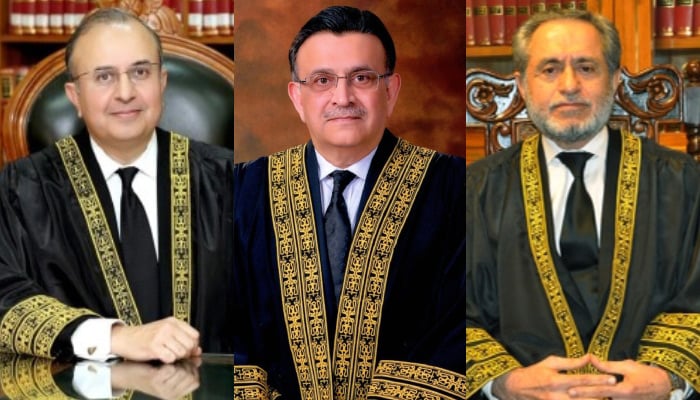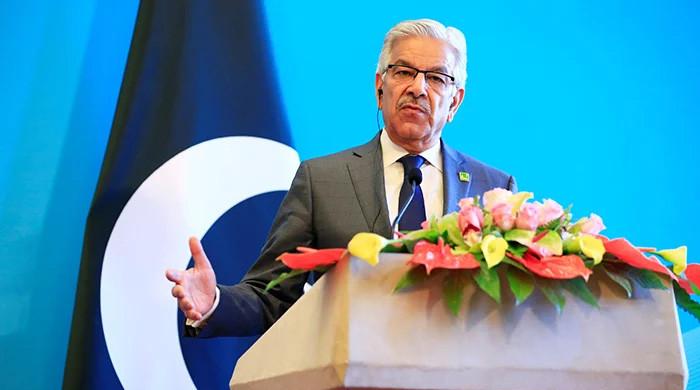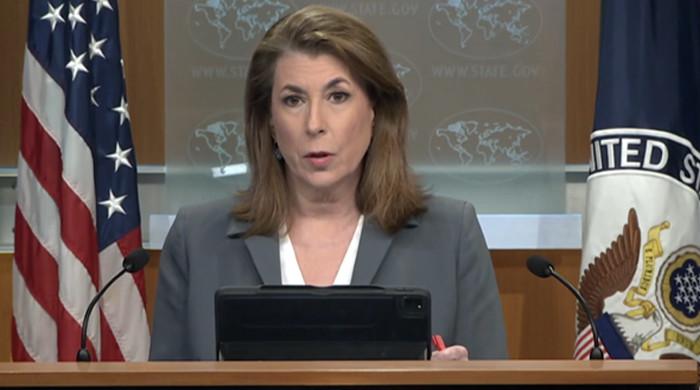Two SC judges raise questions over 'unbridled' powers of CJP
“Supreme Court cannot be dependent on the solitary decision of chief justice,” states judgement
March 27, 2023

- Two SC judges say it is important “to revisit power of ‘one-man show’ enjoyed by CJP.
- "When one person has too much power, there is a risk that institution may become autocratic," they add.
- "Court has been ushered into a political thicket by suo motu proceedings," the believe.
In an unusual development in the top court, two judges of the Supreme Court raised questions over the powers of the chief justice of Pakistan (CJP), saying the apex court “cannot be dependent on the solitary decision of one man, the Chief Justice”.
In a 27-page detailed note for the apex court's March 1 verdict in Punjab and Khyber Pakhtunkhwa suo motu, Justice Syed Mansoor Ali Shah and Justice Jamal Khan Mandokhail pointed out that it is important “to revisit the power of ‘one-man show’ enjoyed by the office of the Chief Justice of Pakistan [Umar Ata Bandial]".
The development comes minutes after the Supreme Court served notice to the Election Commission of Pakistan (ECP), adjourning the hearing on PTI’s petition challenging the electoral body’s orders to put off Punjab Assembly elections till October 8.
“This court cannot be dependent on the solitary decision of one man, the Chief Justice, but must be regulated through a rule-based system approved by all Judges of the Court under Article 191 of the Constitution, in regulating the exercise of its jurisdiction under Article 184(3) including the exercise of suo motu jurisdiction; the constitution of Benches to hear such cases; the constitution of Regular Benches to hear all the other cases instituted in this Court; and the constitution of Special Benches,” it read.
Highlighting the drawback of running a “one-man show”, Justice Shah and Justice Mandokhail mentioned that it leads to the concentration of power in the hands of one individual, making the system more susceptible to the abuse of power.
“In contrast, a collegial system with checks and balances helps prevent the abuse and mistakes in the exercise of power and promote transparency and accountability,” they mentioned, adding that it also ensures good governance as it rests on collaboration, shared decision-making and balance of power.
“When one person has too much power, there is a risk that the institution may become autocratic and insulated, resulting in one-man policies being pursued, which may have a tendency of going against the rights and interests of the people,” the document read.
The two judges, mentioning that the justice system stands on public trust and confidence reposed in it, emphasised that “one-man show needs a revisit as it limits diverse perspectives, concentrates power, and increases the risk of an autocratic rule”.
They mentioned that the chief justice of this court was conferred with wide discretion in the matter of constituting benches and assigning cases to them under the present Supreme Court Rules 1980.
“Ironically, this court has time and again held how public functionaries ought to structure their discretion but has miserably failed to set the same standard for itself leaving the chief justice with unfettered powers in the matter of regulating the jurisdiction under Article 184(3) (including suo motu) and in matters of constituting benches and assigning cases.
“It is this unbridled power enjoyed by the chief justice in taking up any matter as a suo motu case and in constituting special benches after the institution of the cases and assigning cases to them that has brought severe criticism and lowered the honour and prestige of this court.”
'Court ushered into a political thicket'
They said that the court has been ushered into a “political thicket” by the “suo motu” proceedings and the connected constitution petitions, which commenced last year with the dissolution of the National Assembly of Pakistan and reached the dissolution of the provincial assemblies of two provinces this year after passing through the disputes over the matters of counting of votes of defected members of political parties and election to the office of the chief minister of a province, and that too, in the exercise of its original jurisdiction under Article 184(3) of the Constitution.
Juxtaposing the majoritarian verdict as “dictatorship”, Justice Shah and Justice Mandokhail said that democracy does not mean majoritarian rule.
“The essence of democracy is the participation of all concerned in the decision-making process and arriving at collective decisions by accommodating differences of interest and opinion to a possible extent.
“Taking all decisions only by majority rule is no less dictatorship, and the absolutist approach to controversial issues is the hallmark of extremists.”
Rule-based institution
The two top court judges suggested that in order to build a strong, open and transparent institution, “we have to move towards a rule-based institution”.
“The discretion of the Chief Justice needs to be structured through rules,” they asserted, adding that the court has held that structuring discretion means regularising it, organising it and producing order in it, which helps achieve transparency, consistency and equal treatment in decision-making — the hallmarks of the rule of law.
They highlighted the seven instruments that are usually described as useful in the structuring of discretionary power, which include:
- Open plans,
- Open policy statements,
- Open rules,
- Open findings,
- Open reasons,
- Open precedents,
- Fair procedure.
"[...] This court needs to be rule-based and those rules should be uniform, open and available to the public," they added.












